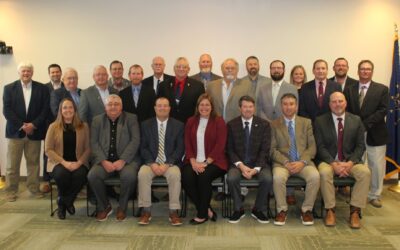ICGA, ISA share views during Rep. Baird’s Farm Bill Listening Session
Leaders from the Indiana Corn Growers Association (ICGA) and the Indiana Soybean Alliance Membership & Policy Committee (M&P) attended a Farm Bill Listening Session on Aug. 18 to discuss priorities for the 2023 Farm Bill. The session was hosted by Rep. Jim Baird (R-Dist. 4) and included Rep. Greg Pence (R-Dist. 6) and Rep. Victoria Spartz (R-Dist. 5). The three members of Congress listened to more than 20 agricultural organizations testify on priority policies for the next farm bill.
Congress reauthorizes a comprehensive agricultural policy known as the farm bill every five years. This legislation directs USDA programming, including nutrition assistance, conservation, commodity markets, research, rural development and more. This policy impacts all Americans, but especially those in rural communities, and the livelihoods of U.S. farmers and ranchers. The most recent farm bill, the Agriculture Improvement Act of 2018, was signed into law by President Donald Trump in December 2018 and authorizes programs and spending through Sept. 30, 2023.
As a leader in the House Agriculture Committee, Rep. Baird is positioned to help shape the development of the 2023 Farm Bill. The listening session was designed to gather testimony from an invited group of stakeholders impacted by the farm bill’s food and farm policy.
“Our farmers are the backbone of our nation, and I believe that Hoosier farmers deserve a seat at the table as Congress prepares for the 2023 farm bill,” said Baird, who has owned Baird Family Farms near Greencastle, Ind., since 1980. “Hoosier farms and farmers across the nation play a critical role in feeding, fueling and clothing our grateful country, and they can provide invaluable feedback as we draft the next farm bill. I look forward to sharing these critical stakeholders’ testimony with my colleagues.”
Baird is determined to start the process on the 2023 Farm Bill earlier than current three-year-old policy.
“You know, it always amazes me, the last farm bill we passed was in December of 2018. So, we just barely got it under the wire,” Baird said. “So, I think it’s a responsibility for us on the ag committee, of which I am a member, to start that conversation now. We’re halfway through, and I realize we’ve had a pandemic, but we’re halfway through, more than halfway through, to the need for the next farm bill.”
Baird said complications due to the COVID-19 pandemic have exposed some changes that should be covered in the next farm bill.
“We have recognized some of the, maybe, weaknesses in our supply chain, our food supply chain. We are probably going to discuss those and make sure that we can make improvements there and in programs and incentives,” Baird said.
Keep crop insurance, boost trade
ICGA President Mike Beard told the lawmakers that maintaining the crop insurance program is vital for U.S. farmers. Beard added that the flexibility changes made to the Agriculture Risk Coverage (ARC) and Price Loss Coverage (PLC) programs in the last farm bill have also helped.
“With the 2018 Farm Bill, we saw a strengthening of revenue-based risk management tools, including the improvement of the Agriculture Risk Coverage county program,” said Beard, a corn, soybean and hog farmer from Frankfort, Ind. “It allowed producers to elect ARC and PLC coverage for the 2019 and 2020 crop years and make changes annually starting with the 2021 crop year.”
“(Farmers are) going to want to keep the risk management part of that. Our financial members, our banks, have appreciated having that risk management where we can fall back on, and we can purchase insurance to protect ourselves. Because the dollars that are involved on these farms are significant and we, as farmers, cannot afford to lose a year’s production.”

M&P member and American Soybean Association Director Phil Ramsey, who farms near Shelbyville, Ind., testified that strong export programs help all farmers. He testified that the Market Access Program (MAP) and the Foreign Market Development (FMD) programs increase trade and market expansion efforts by U.S. farm organizations.

“For the 2023 Farm Bill, we would ask that Congress consider increased funding for the trade promotion programs, Market Access Program and Foreign Market Development,” Ramsey said. “Trade is the heart of the U.S. farm economy because American farmers are the best in the world at what they do. Support for trade expansion initiatives is support for rural economies across the U.S.”
Beard added his support for more trade opportunities.
“Though we want to be prepared for the worst, we want to hope for the best, and the best way to strengthen the farm economy is with the facilitation of healthy markets and robust trade. Farmers will always want trade rather than aid,” he said. “We do hope that Congress will find ways to help eliminate trade barriers, such as the issue we’re currently experiencing with Mexico’s unwillingness to accept GM traits and glyphosate-treated commodities.”
Ramsey also discussed the importance of keeping Beginning Farmer and Rancher Loans available through the USDA’s Farm Service Agency (FSA) and investing in research and promotion of new, ag-based products, such as PoreShield, a soy-based concrete enhancer. Among Ramsey’s biggest concerns, though, is the rising cost of farming.
“Prices have pretty much skyrocketed on fertilizer,” Ramsey said. “Nitrogen prices, they’re almost double of what they were a year ago.”
Pence recognized Ramsey’s worry and added that he’s heard from others in his district about rising input costs. “I’m concerned that the inflation could continue to outstrip what prices are going to be like in the fall,” he said.
Pence is also wary of changes in the Biden Administration’s environmental policy causing farmers to adjust how they farm. “There is one thing I’m a little concerned about – as we go forward. I am a Republican, increased regulation on the ag industry is something I’m very concerned about,” he said. “I was happy to hear farmers talk specifically about what they are fearful of.”
A good start
Rep. Spartz and Rep. Pence appreciated the input during the listening session.
“Agriculture is a significant contributor to Indiana’s GDP. Our state is also in a unique position to advance innovation and value-added services for advanced agriculture,” said Spartz, who owns a Hamilton County, Ind., farm with her husband, James. “I appreciate Rep. Baird for hosting a roundtable discussion to solicit valuable feedback from industry stakeholders.”

Pence added, “In Indiana and especially the Sixth District, the agriculture community is large and diverse. Hoosiers throughout the state will be affected by the next farm bill. I would like to thank my colleague, Congressman Jim Baird, for putting together this important listening session and his leadership on the House Agriculture Committee. I look forward to continuing to work together to ensure Hoosier voices across the state are represented in D.C.”
Many of the farmers who attended the session believe it is not too early to begin the process of preparing for the next farm bill. “It’s just important that we can get a good farm bill put together, and there are a lot of pieces to it that are important to the whole economy, not just the farmers,” Ramsey said.
Posted: October 31, 2022
Category: ICGA, Indiana Corn and Soybean Post - Fall 2021, ISA, News




